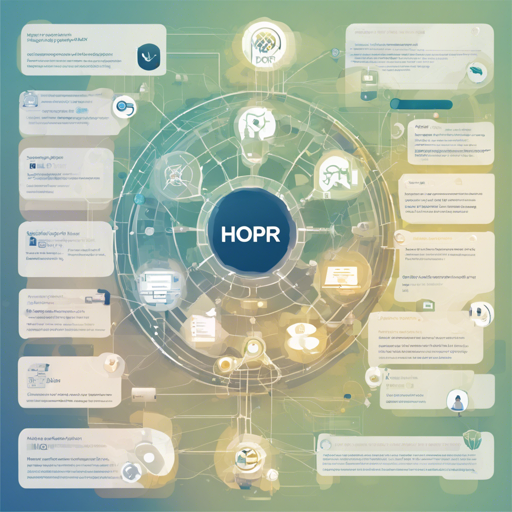In today’s digital age, privacy is key to secure communication. HOPR is a privacy-preserving messaging protocol designed for just that. In this guide, we’ll walk through the installation, usage, and troubleshooting of HOPR, enabling you to establish a secure communication network powered by relay nodes.
Table of Contents
About
The HOPR project creates various components for running and modifying HOPR nodes, including:
- hopr-lib: A transport layer for HOPR protocol implementation.
- hoprd: A daemon application with a REST API for compliance with the HOPR protocol.
- hoprd-api-schema: Utility for generating the OpenAPI spec.
- hoprd-cfg: Configuration management tool for hoprd.
- hopli: Utility for on-chain and identity-related tasks.
Install
To ensure proper performance, always run the latest stable release. There are two primary installation methods: Docker and Nix package manager.
Install via Docker
To install any specific release, set the $RELEASE variable. For instance:
export RELEASE=latestThen, pull the required container image:
docker pull europe-west3-docker.pkg.dev/hoprassociation/docker-images/hoprd:saint-louisIt’s recommended to set up an alias for easy command invocation.
Install via Nix package manager
This is useful for development purposes. Clone the repository:
git clone https://github.com/hoprnet/hoprnetThen build and install:
nix build
sudo cp result/bin/* /usr/local/bin/Usage
Once installed, hoprd allows various command-line configurations:
hoprd --helpFor example, a basic command setup could look like:
hoprd --identity apphoprd-db.hopr-identity --password securepassword --init --announce --host 0.0.0.0:9091 --apiToken YOUR_TOKEN --network dufourIn this command, think of your HOPR node as a house:
- **–identity**: The key to the house.
- **–password**: Your security alarm password.
- **–init**: Setting up the house for the first time.
- **–announce**: Telling others your house is ready for visitors.
- **–host**: The address where your house is located.
- **–apiToken**: A token granting access to your collection of valuable items (data).
- **–network**: The street name where your house is located (the blockchain).
Using Docker Compose with Extended HOPR Node Monitoring
For additional monitoring, you can use Docker Compose:
docker compose --file scripts/compose/docker-compose.yml up -dThis will set up a monitoring dashboard for your HOPR nodes.
Testnet Accessibility
To participate in the public network, ensure your node is eligible. For more details, refer to Network Registry.
Migrating Between Releases
There is no backward compatibility, hence follow these steps to migrate:
- Change the channel strategy to passive.
- Redeem all unredeemed tickets.
- Close all open payment channels.
- Withdraw funds to an external wallet.
- Note the network name.
- Backup the identity folder.
- Launch a new instance with the latest release.
Develop
There are multiple options for development setup, including using Nix and Rust toolchain. Ensure the relevant environment is prepared for efficient coding and testing.
Test
Regular testing is crucial for ensuring stability. The HOPR codebase includes unit testing and CI using GitHub Actions. You can run tests locally to ensure everything is functioning correctly:
make testTroubleshooting
If you encounter issues, try the following:
- Check the container logs for errors using:
docker logs CONTAINER_ID. - Ensure network settings are correctly configured.
- Revisit the command-line arguments and ensure they are correctly defined.
- Consult the community or resources available on GitHub.
For more insights, updates, or to collaborate on AI development projects, stay connected with fxis.ai.
Conclusion
At fxis.ai, we believe that such advancements are crucial for the future of AI, as they enable more comprehensive and effective solutions. Our team is continually exploring new methodologies to push the envelope in artificial intelligence, ensuring that our clients benefit from the latest technological innovations.

